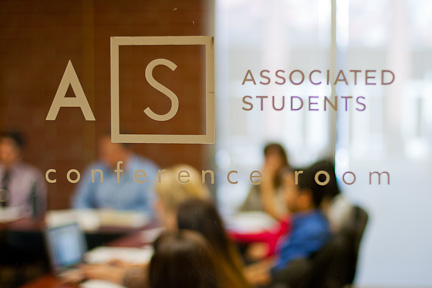Associated Students is approving more large sum student proposals than in previous years. The number of student films seeking help from AS remains high, and while events like Hart Hall’s Deck the Haven have grown in popularity, so has the cost.
The AS senate granted this year’s Deck the Haven $3,600, which is five times the $636.97 approved by the 2011 senate and almost double the amount approved in 2012. This trend of increased cost for annual events is relatively new, said Laura Igram-Edwards, AS adviser.
There currently is no cash limit set for student proposals, but AS is willing to consider placing a limiting standard in order to be fair to each group that proposes to the senate, Igram-Edwards said.
Past administration speaks
One reason that the senate might be inclined to pass annual student events requesting large amounts of funding is a potential lack of other proposals that aren’t as effective, said Laura Cook, 2012 AS senior vice president.
However, funding annual dorm events for such substantial amounts may not be the responsibility of AS, said Janine Marderian-Nichols, 2011 AS president and 2013 alumnus.
“If it’s not a big priority for ResLife then I’m not totally sure that it should be for AS,” Marderian-Nichols said.
AS believes funds are well-spent
AS is confident that the student fee is spent to benefit the Biola community and takes student opinion into consideration, Igram-Edwards said. Resident senators vote according to the desires expressed by their residents, said Becky Gallacher, AS senior vice president.
The amount given to a student proposer is based on a variety of factors, such as the needs of the initiative, the presentation of the proposal, the anticipated attendance to the event and the members of the senate that year, Igram-Edwards said.
Funding student films
AS has given a total of $6,000 to various student films since the beginning of the semester. In the past, AS had varying standards on funding student films.
“There hasn’t been a consistent philosophy on it, and I think that’s confused students over the years,” Marderian-Nichols said.
Some have argued that it is the duty of AS to assist students in producing quality films so that they can better represent Biola, however this should not be the responsibility of AS, Marderian-Nichols said.
“AS does not exist for publicity reasons, it exists to support students and benefit students,” Marderian-Nichols said.
Some students believe that AS could play a big role in supporting the film department.
“They represent our entire university, so I think that it is important that we are creating good films, and if AS can be a part of that, I think it’s pretty essential,” said Paul Maertens, a Biola 2013 alumnus who majored in film.
The high number of students turning to AS can be attributed to students making bigger projects, speculated Maertens. However, some films require more funding than others, and that may be the reason why not all students turn to AS, Maertens said.
The content of the script may be another reason a film may be denied AS assistance.
“I would hope that they would base it on the film’s content-applicability to Biola,” said Zack Smith, junior film major.
In the past, AS has tried to only give funding to student films that will premiere on campus and be an event for students. Although not every film proposed to AS receives funding, the film students remain understanding. One of the films that was denied is Paul Maertens’ “The Last Raptor,” partly because it is not yet finished, Maertens said.







